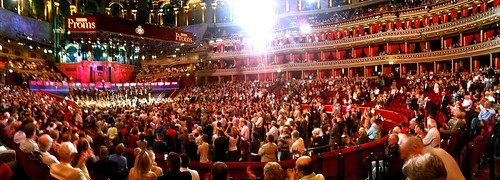The Proms is over for another season. It was my first as a member of the Radio 3 family and I’m a bigger fan than ever. Here’s why.
- It’s a journey. Over 80 concerts leading audiences (nearly a third of a million tickets were sold for the 2011 season) through the riches of the classical repertoire. As a member of the team, I can’t overstate the thrill of being able to attend so many of the concerts. And my musical knowledge (pitiful to begin with, I’ll admit) has been expanded massively (go on, ask me anything).
- It’s a massive event. Classical music’s Glastonbury. This year’s Beethoven cycle – all the symphonies from Daniel Barenboim and his West-Eastern Divan Orchestra – was momentous and the the collision with the Olympics and Paralympics at the Last Night felt absolutely right.
- It’s accessible. £5 for a standing ticket and never sold out. They call it the Proms because you can walk right up. And it’s been like that since the beginning. It’s really the whole point of the season. You should try it.
- It’s amazingly vivid radio. The best bit, of course. Every single concert is broadcast live on Radio 3. An enormous enterprise requiring a permanent encampment of trucks outside the Hall (some of them are on the telly, too, of course, if you like that sort of thing).
- It’s online. Properly. And the BBC’s seven-day window means that a visit to the web site during the season will typically bring you forty or fifty works (in sparkling, unprocessed HD Sound, natch) to listen to. A kind of rolling window on the repertoire that no other music festival can provide (all gone now, sadly, but these highlights will be around for a while).
- It’s adventurous. Since the very beginning, the Proms has hosted new works and new artists. Since the time of Director William Glock in the Sixties, the festival’s gone further and hosted works and events that would rarely have been seen anywhere else. This continues. 2012’s celebration of John Cage saw the Hall filled with cactuses and happy crowds wandering the streets of West London in procession, for instance.
- It’s all about the young people. Youth orchestras, bands and choirs were all over the programme this year. It was thrilling to hear the big works revisioned by this army of young musicians from around the world (personal youth highlight: The National Youth Orchestra of Great Britain’s dazzling Prom 29 with Anna Meredith’s Handsfree).
- It’s joyful stuff. Some people, let’s face it, think classical music’s forbidding or hard work, or a bit snooty. An encounter with the Proms is quite the opposite, an antidote to all that: a happy, open and welcoming sequence of quite glorious events.
Update: yes, I added one.
Roger Wright, Director of the Proms (and Controller of Radio 3), introduced the season on the Radio 3 blog and had a good go at converting Laura Barton to classical music in The Guardian too.


